Lost Illusions: The Verve of the Downhill Path
By Diane Sippl
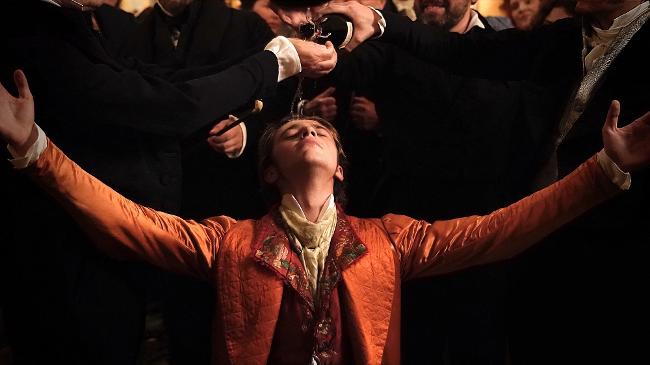
I have always lived with the idea of one day making a film adaptation of Lost Illusions. But it was out of the question for me to color the novel's images, to clumsily plagiarize the story in an academic adaptation. Art feeds on what it burns. Cinema is by nature the transfiguration of a reality or of a book—otherwise what is the point?
Xavier Giannoli
The Closing Night presentation of the 25th Annual COLCOA French Film and Series Festival in Los Angeles from November 1-7, 2021, returning to the theater (the glorious newly renovated Directors Guild of America theater) after a pandemic hiatus for in-person viewing, was not to be missed. Lost Illusions, winner of no fewer than six top French Cesar Awards (comparable to the Oscars), including Best Film, Best Adapted Screenplay, and Best Cinematography, filled the house with cinematic awe. To a capacity crowd, in the state-of-the-art Renoir Theater at the DGA, it played like this…
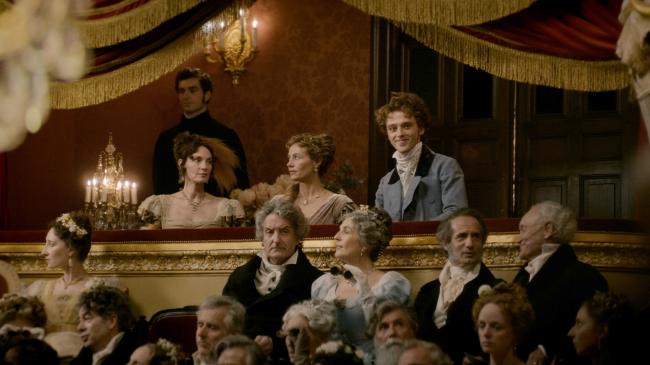
Delivering a grand historical novel to the screen, French filmmaker Xavier Giannoli unfurls the classic with a rush—of excitement, commotion, panache. This is not slow cinema. As the director puts it, his Lost Illusions brings us “the physical sensation of a civilization in full mutation.” And it happens so fast we hardly recognize it as the past. Giannoli wisely limits his scope to the second part of Honoré de Balzac’s humungus novel, Un Grand homme de Province à Paris, and for about two-and-a-half hours, he takes your breath away.
A superb ensemble of actors, location shooting at fascinating Parisian sites, a break-neck pace with masterful editing, dashing sets and costumes that convince without announcing themselves, and a measured dose of voice-over narration make for a thrilling ride, but what is truly jaw-dropping throughout is the feeling of being not in the Paris of 200 years ago but in the heartbeat of our own time, in any major city, facing the same conflicts. How does cinema travel two centuries—and yet, not at all? How does it bring old pages to new screens?
“It was music that brought me back to what we look for beyond words in the work of cinema, especially when it is a literary adaptation,” the writer-director explains. He refers to the re-orchestration of Vivaldi in a “romantic” style, and to the “dialogue” of themes among pianos in a Bach concerto. “Different eras thus discover a secret harmony, like ours with that of Balzac….”
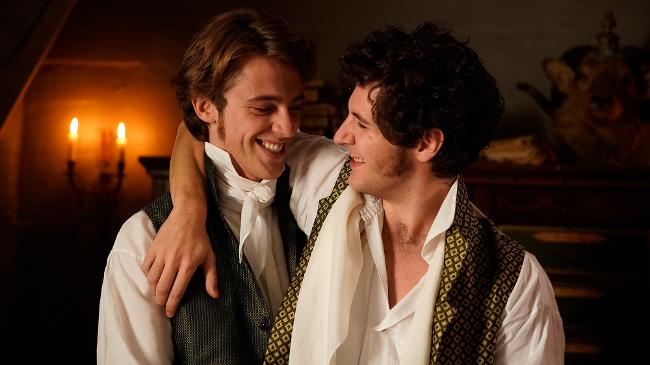
The adaptation shores up many of the novel’s themes, and they couldn’t be more solidly braided together. Money, connections, and the press drive success, and without them, talent goes unrecognized. While hidden finesse allows for acceptance by the aristocracy, it turns ambition into venality. Success requires mastering the social codes of the marketplace, which includes acknowledging that money is always more powerful than artistic merit. Setting aside Nathan, our narrator and model of good form who has attentively honed a way to live with his scruples and vision at once, the film’s three haplessly genuine characters—Lucien, Louise, and Coralie—too easily conform to conventions without the savvy to use them, and they become swallowed up in the brutal commerce of rising capitalism in early 19th–century Parisian society.
Call it provincial naïveté, lust for life, or the inability to resist, young poet Lucien makes all the wrong choices. Giannoli tells us, “Several characters see Lucien falling apart and tell him so, warn him... but he ruins himself in spite of everything... Out of revenge, greed, convenience, unawareness, innocence, survival instinct, pleasure...” Sooner than later, Lucien gives up his passion for literature—and his ethics along with it—and succumbs to the newly flourishing business of journalism, a cut-throat, do-or-die brand of gang warfare that throws truth and integrity out the window with howling laughter.
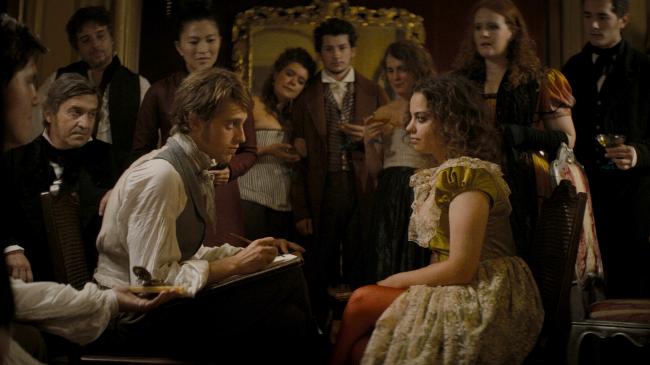
False information and a denial are already two events!
William Randolph Hearst
For those who think fake news arose in the 21st century with the likes of Fox TV, or in the 19th century, for that matter, with Pulitzer’s yellow journalism that paved the way for Hearst’s star-making mega-media, Giannoli shows that the deliberate concoction, dissemination, and profitability of disinformation and baseless opinion grew up with the printing press and developed as soon as its output could be monetized. However, “the news,” bought and sold for money, meant that human values also became monetizable.
The new public hero was the business tycoon, even if he had to dirty his hands with capital; thus, the new “self-made man” was the money-made man, land and title be damned, and if it had been beneath the dignity of nobles who resided in Paris and satisfied their whims at balls, operas, and ballets to bend to the rule of stocks and banks, they now voluntarily suppressed their old values and decorum to belong to the new Parisian “moneyed aristocracy.”
It is into this social stratum that Lucien, a poet from the provinces, seeks entry by casting himself in his mother’s maiden name, Rubempré, and when it does not suffice for his quest of entitlement, the young idealist learns to sell, by generating advertisements, and to sell himself by trading his integrity for profit. This, he learns, is what builds a reputation: not honest work, writing, but being—or being seen, that is, and always with possessions, commodities, at his disposal.
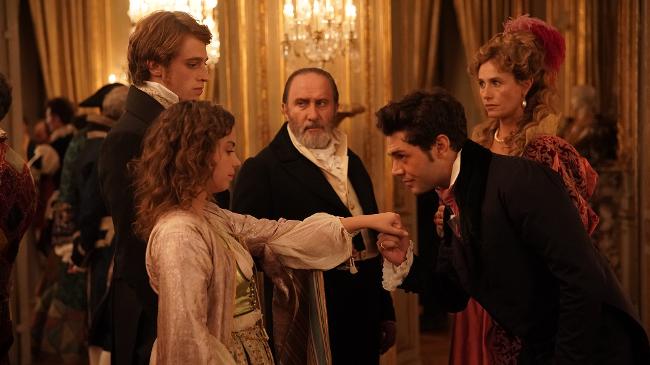
Giannoli plays with those possessions—Lucien’s absurd clothes and hairdo for the opera, animals such as monkeys and ducks that ridicule both the targets of the critics and the critics themselves. There is little difference between the bribed journalists of small newspapers who fight with inkwells and the claquers trained to fling tomatoes or dead cats at actors on stage when not signaled to sing wild applause at a theatre performance; both are workers for hire to serve the corrupt and inept needs of capital.
The concrete symbols of both bad faith and cruelty, of commercial warfare, are gloriously tactile in Lost Illusions. Shreds of paper fly into the air like a snowstorm; black ink splats and dribbles down Lucien’s body; newspaper sheets roll through the physical press—as if to remind us that our own news stories, fast losing the written word, are now digital and ever as much dependent on money as the cinema we are viewing.
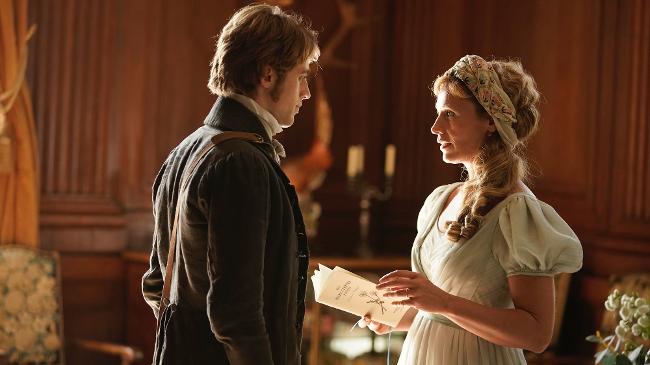
Lost Illusions takes us to real locations in Paris, a sensual expedition in the authenticity of spaces—the Boulevard du Crime, for example, and the Château de Compiègne, where the film uses a bit of poetic license to create a dark scene of theatre assault on the actress Coralie. Lucien’s character point of view commands a backstage perspective enhanced by special lenses in the camera that darken the edges of the frame; textures, colors, sound and movement turn the whole society into the spectacle of illusions it was, where only the flesh could be real—physical love and the violence against the body at once.
Generally speaking, the film opens with one—the consummate frolicking of Lucien and Louise—and closes with the other—the pummeling of the already dying Coralie. Giannoli renders each of these loving relations with tender sentiments of mutual respect not delineated in Balzac’s novel. For example, in a visit to the countryside, Coralie makes a striking impression when she pleas to Louise not to take Lucien from her. Quite beside herself, Louise acquiesces, though she can hardly let go of her feelings for Lucien and continues to harbor them, as does he. Their clandestine longing for each other, social and generational mismatch that they are, aligns Louise and Lucien in the tragedy of poetic aspirations in the same society that destroys the emerging thespian Coralie, body and soul. “What have they done with us?” Louise asks Lucien upon his final demise. The question speaks for the young Coralie as well.
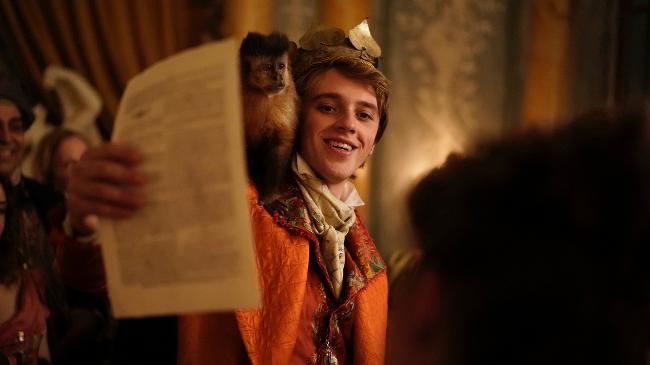
As for the third femme of the film, Madame d’Espard, her haute demeanor and insidious smiles may actually mask an interior sense of inferiority—why is it that she herself has never been seduced by the rakish Lucien? His pretensions in social climbing are not half as insulting as his airs of sexual indifference toward her; vanity (in her case) is not a good balm for the heart.
Another smile, a bragging smile, announces, “And yet I was good…”—the innuendo introducing another mask, this time for Étienne Lousteau, who is really almost (but not quite) admitting that he “sold” his vocation, his talent, his name. What’s worse, he sold them to a shameless fool, Monsieur Dauriat, a one-time vendor at the produce market who can’t read a word but is the king of Parisian publishers. Money rules—it hires wizard wordsmiths like Lousteau (and Lucien) to topple commercial competitors. A friend in laughter, both beguiling and betraying, Lousteau is ever the counterpart of Lucien Rubempré in the tragic enterprise of lost illusions. But Lousteau knows his game.
And that game cannot compete with the work—and the gift—of Nathan, a bonafide writer who would have Lucien become the same. Adept at the social rules, Nathan nonetheless (or, therefore) retains his voice and vision as an author. As is fitting, he’s the off-screen narrator of the film, his vocalised wisdom drawing as much compassion for the tragically befuddled Lucien as Nathan’s polished social style wins admirers among the literati. Actor-filmmaker Xavier Dolan simultaneously endows Nathan with impeccable charm and the film itself with the aura of cinema so characteristic of Balzac’s writing.
Lost Illusions
Producers: Olivier Delbosc, Sidonie Dumas; Director: Xavier Giannoli; Screenplay: Xavier Giannoli; Adaptation and Dialogue: Xavier Giannoli, Jacques Fieschi; Cinematography: Christophe Beaucarne – AFC SBC; Editing: Cyril Nakache; Sound: François Musy, Renaud Musy, Didier Lozahic; Sets: Riton Dupre-Clément – ADC; Costumes: Pierre-Jean Larroque – AFCCA.
Cast: Benjamin Voisin, Cécile De France, Vincent Lacoste, Xavier Dolan, Salomé Dewaels, Jeanne Balibar, Gérard Depardieu, André Marcon, Louis-Do Lencquesaing, Jean-François Stévenin.
150 min., Color, Wide Screen. In French with English subtitles.